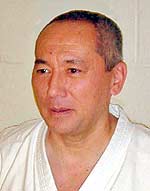Martial Mania
Ikkiri Jûgiri
By George Donahue

There is a very simple and useful motto that was for centuries kept as
a core truth by a particular samurai family in Japan, and that is still
observed by some of the descendents of that family: “ikkiri jûgiri.”
Literally, it means “one cut, ten cuts.” When I was a child,
I understood this motto to mean “If you cut me or mine once, I or
we will cut you or yours ten times.” If you offend me once, I’ll
retaliate tenfold. Early on, I adopted this motto, with this understanding
of its meaning, as my own. This meaning was indeed the most immediately
important, for its practice enabled that rather small family to survive
centuries of war and aggression by its much larger and more powerful neighbors.
It helped the family’s descendents to make it through tough or dangerous
modern times, too.
After I had internalized this motto, I learned that it was, in addition
to a threat or warning, a statement of obligation. Not only would the
family retaliate ten times over, it was the absolute obligation of each
member of the family to see that the retribution was carried out. The
motto instilled ferocity in its adherents; it made them tough enemies
you wouldn’t want to stir up. A good motto for a hornets’
nest.
But there was more to it than that. The motto has always been qualified
by the idea of “the sword that gives life,” the idea that
you take up arms, reluctantly, to save life or, paradoxically, to preserve
peace. I used to think that this was a mere platitude issued to make war
and aggression seem more righteous. I’ve often been wrong, and I
was wrong about this—or maybe advancing age and arthritis have forced
me to be more peaceful in thought and deed.
As I grew older, I saw that ikkiri jûgiri also applied to reciprocation
of good actions. If someone did me a kindness, then I had a personal ethical
obligation to repay that kindness tenfold. (It took maturity to understand
this, even though I had been told often enough.) This understanding led
me, for example, to donate ten pints of blood to the Red Cross for every
pint that my father had received in transfusions during his surgeries.
Although he hadn’t needed a whole lot of blood, as transfusions
go, it nonetheless took a long time to pay that debt, even counting the
extra pints from apheresis. Once I’d paid it off, I continued to
make regular donations, at the shortest interval possible. Blood donation
had become habitual, but there was also the feeling that I would be prepaying
my reciprocation for kindnesses and good things that might come to me
in the future.
As I’ve grown still older, I’ve realized more and more that
the simple initial interpretation of ikkiri jûgiri is far from the
best. It has been a good motto all these centuries because it has been
so complete. It was not only the ferocity of the family that helped it
to survive, it was the equally obvious generosity. My own children have
adopted this motto, too, and they’re reaching an age where they
seem to understand that kindness is to repaid tenfold, as well. I’m
glad.
About The Author:
George Donahue has been on the board of FightingArts.com
since its inception. He is a freelance writer and editor, providing literary
and consulting services to writers, literary agents, and publishers, as
well to advertising agencies. He has worked in publishing for more than
three decades, beginning as a journal and legal editor. Among his positions
have been editorial stints at Random House; Tuttle Publishing, where he
was the executive editor, martial arts editor, and Asian Studies editor;
and Lyons Press, where he was the senior acquisitions editor and where
he established a martial arts publishing program. He is a 6th dan student
of karate and kobujutsu—as well as Yamane Ryu Bojutsu—of Shinzato
Katsuhiko in Okinawa Karatedo Shorin Ryu Kishaba Juku. He was also a student
of Kishaba Chokei and Nakamura Seigi until their deaths. He teaches Kishaba
Juku in New York and Connecticut, as well as traveling to provide seminars
and special training in karate, weapons, and self-defense. His early training
was in judo and jujutsu, primarily with Ando Shunnosuke in Tokyo. He also
studied kyujutsu (archery), sojutsu (spear), and kenjutsu (swordsmanship)
in Japan as a youth. Following his move to the US, he continued to practice
judo and jujutsu, as well as marksmanship with bow and gun, and began
the study of Matsubayashi Ryu karate in his late teens. Subsequently,
he has studied aikido and taiji and cross trained in ying jow pai kung
fu. |